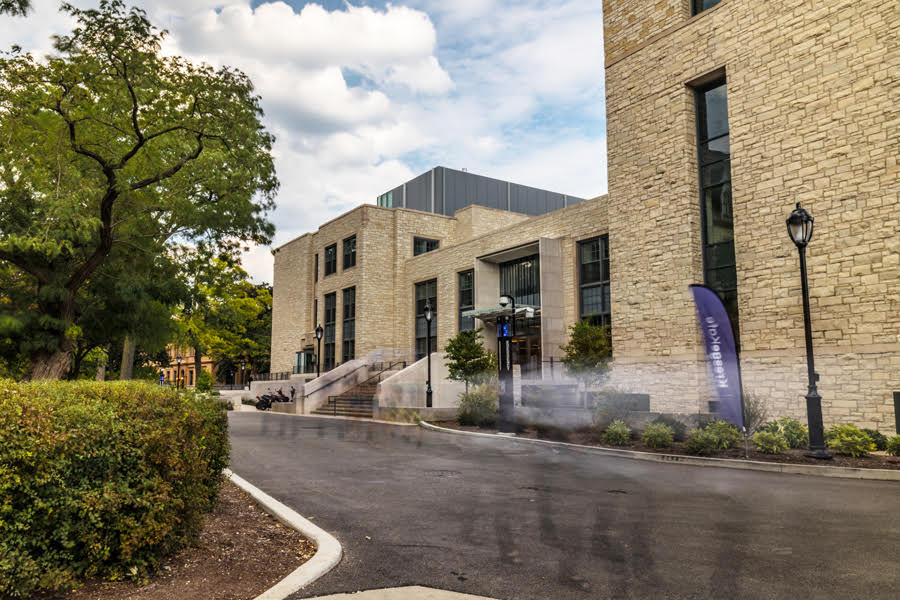Queertopia reimagines scholarship, activism and queer and trans futures in 14th year
Daily file photo by Alec Carroll
Kresge Centennial Hall, where Queertopia was held last year. Queer Pride Graduate Students Associated hosted the conference on queer scholarship for the 14th year.
April 27, 2021
Starting off the keynote conversation in Queertopia on Sunday, writer and comedian Lexi Adsit said trans women of color possess powers of world-changing and world-thinking.
Adsit started to compile an anthology last year titled “Paradise on the Margins: Lessons and Dreams from Trans Women of Color.” At the event, Adsit emphasized Black trans womens’ founding of organizations that ensure community survival.
“That’s the kind of work that I want to lift up and recognize, and there’s so many incredible stories and individuals that are just making the world a better place,” Adsit said.
Over the weekend, Queer Pride Graduate Student Association hosted its 14th annual Queertopia, a conference that celebrates queer scholarship from a wide range of disciplines.
This year’s theme, “Queer Justice, Queer Transformation, Queer Future,” allowed QPGSA to focus on topics including pandemic LGBTQ+ activism, queer coalition building with Black and Indigenous communities, police and prison abolition and disability advocacy.
Saturday’s portion centered a keynote conversation between Penn State Prof. Hil Malatino and Smith College Prof. Jina B. Kim titled “Trans/Queer/Crip-of-Color Care” and moderated by Asian American studies Prof. Patricia Nguyen.
On Sunday, “Paradise on the Margins” co-editors Adsit, Nava Mau, LaVelle Ridley and Ph.D. candidate Erique Zhang engaged in further discussion on the anthology.
Ph.D. student Malú Machuca Rose, QPGSA academic chair, helped organize the event. They said the conference’s virtual setting prompted by the COVID-19 pandemic gave some breathing room for QPGSA members. It also allowed Queertopia to invite scholars who lived in Scotland and New Zealand.
However, queers are always living in a state of emergency, ellx said.
For Machuca Rose, they said, the emphasis of this year’s programming is about dreaming both inside and outside of academia as a method of queer survival and prosperity.
“Moving… away from the normative nine-to-five like rigid standard of life and into something more capacious — I think that’s the general feeling of the conference,” ellx said.
Machuca Rose said they particularly enjoyed a panel on police abolition and pleasure activism, a Black feminist method of social justice that combines with joy.
Queertopia also emphasizes interdisciplinary thinking. Ph.D. student and QPGSA advocacy chair Nathan Lamp said they understand that queer activism and queer scholarship is always in conversation.
Furthermore, Lamp said this year’s conference in particular has been shaped by the pandemic and the continued swelling of anti-Blackness and other forms of marginalization.
“I think this is a real opportunity to think about … how we care for each other and how we show up for each other, and the sorts of worlds that we would love to live in, the sort of work that we need to do to get there,” Lamp said.
Machuca Rose said they and Lamp joked that preparing for the conference allowed them to contribute material for their doctorate examinations and assignments.
Queertopia gathered scholars who were also engaged in grassroots activism, Machuca Rose said, to think about the queer and trans future of possibilities that exclude the carceral regime.
“For me personally I was also thinking outside of the state, thinking outside of carcerality,” ellx said. “With everybody being locked at home and in the pandemic has moved us toward reimagining what have sometimes been sort of like punitive activism.”
Email: [email protected]
Twitter: @YunkyoMoonK
Related Stories:
— Queertopia hosts LGBTQ research presentations
— LGBTQ+ affinity groups foster community, build advocacy networks for faculty, staff and law students
— Queer panelists discuss transgender cultural production as “revolt”


